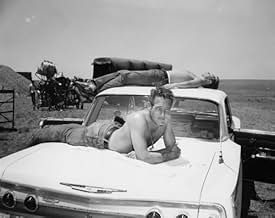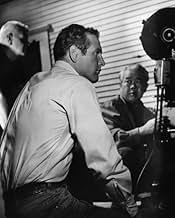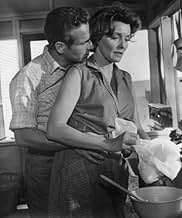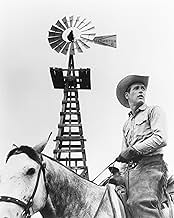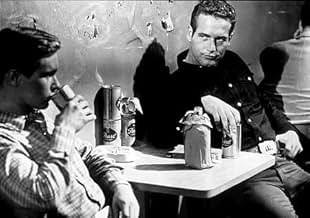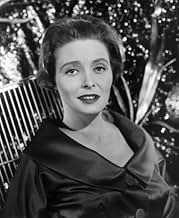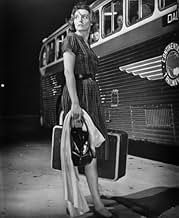CALIFICACIÓN DE IMDb
7.8/10
25 k
TU CALIFICACIÓN
El rebelde Hud Bannon siempre está en desacuerdo con su padre, un viejo y respetable granjero.El rebelde Hud Bannon siempre está en desacuerdo con su padre, un viejo y respetable granjero.El rebelde Hud Bannon siempre está en desacuerdo con su padre, un viejo y respetable granjero.
- Ganó 3 premios Óscar
- 17 premios ganados y 17 nominaciones en total
Brandon De Wilde
- Lonnie Bannon
- (as Brandon de Wilde)
Sharyn Hillyer
- Myra
- (as Sharon Hillyer)
Warren Anderson
- Proprietor Sweeping Glass
- (sin créditos)
- Dirección
- Guionistas
- Todo el elenco y el equipo
- Producción, taquilla y más en IMDbPro
Argumento
¿Sabías que…?
- TriviaPatricia Neal was particularly proud of one unscripted moment that made it into the film. While talking to Hud about her failed marriage, a huge horsefly flew onto the set. Just as she says she's "done with that cold-blooded bastard," she zaps the fly with a dish towel. Martin Ritt loved it and printed the take.
- ErroresIn the first scene, you can see the cameramen and tripod of the cameras in the window of the store.
- Citas
Homer Bannon: Lonnie, little by little the look of the country changes because of the men we admire. You're just going to have to make up your own mind one day about what's right and what's wrong.
- ConexionesFeatured in The 40th Annual Academy Awards (1968)
- Bandas sonorasThe Great Titanic (It Was Sad When That Great Ship Went Down)
(uncredited) (ca 1915)
American folk song
Sung a cappella by Paul Newman and Brandon De Wilde
Opinión destacada
Not only a stark morality tale brimming with grit and substance, "Hud" is a vigorous character study replete with intelligent, Oscar-winning performances.
The vast, desolate "Lone Star" landscape has often inspired potent Hollywood screen-writing (witness "Giant," and "The Last Picture Show"). 1963's "Hud" is no exception. The story focuses around a bored, aimless, arrogant ne'er-do-well whose utter contempt for humanity threatens to denigrate and destroy all those exposed to it. Thrust in a dusty, dried-up, decaying Texas cattle town (awesomely photographed in black-and-white by Oscar-winning cinematographer James Wong Howe), the story bears down assertively on its straightforward themes of nihilistic youth and misguided hero worship.
Paul Newman was awarded an Oscar - but not for "Hud." He took home the award much later for his performance in 1987's "The Color of Money" but for me it was a restitutive pat on the back for his probing, higher-calibre work here in "Hud," among others. Newman gives an assured, excitingly reckless performance, the creme of the crop of earlier, jaunty perfs. All swagger and bluff, reeking with cocky sexuality, Hud Bannon is the personification of cool, callous cynicism at its most reprehensible...and alluring. The world is this cowboy stud's oyster. He takes what he wants, whenever he wants it - whether its coveting his father's land or coveting another man's wife, whether its peddling sick cattle on others or peddling his ethics on a susceptive boy - it's all at the core of a dangerously irresponsible life's dogma. A loser's warped vision of winning. It was a risky star performance for Newman as Hud has no redeeming qualities whatsoever, but the actor plays out his acting cards brilliantly and winds up with a royal flush.
Newman is bolstered by a choice cast. Dusky-voiced Patricia Neal, whose looks had begun to harden by this time, is fascinating as the forlorn, slovenly housekeeper Alma who has her careworn hands full just keeping the lustful, roving Hud in line. Hud (and the audience) is perked by her stifled but not yet snuffed out sensuality, as she wisely avoids the obvious come-ons tossed her way. Making relative peace with her lonely, desultory existence, Alma has overcome a difficult past and find a sense of being as the makeshift homemaker to an aging rancher/widower (Melvyn Douglas) while tending to his impressionable grandson (Brandon de Wilde), instilling in the boy some good old-fashioned sense and motherly attention when necessary. Neal is top-notch especially in her final scenes and quite deserved her Oscar.
Oscar-winning Douglas is superb as Hud's upstanding, uncompromising father, a cattle man in the twilight of his years. Chocked full of conventional wisdom and righteous indignation, the prideful old-timer may or may not have contributed to his son's acute moral letdown, having given up on him as a "bad seed" long ago. Their confrontational scenes are pocked with harsh accusations and bitter conflict - never to be resolved. De Wilde, in a coming-of-age extension of his memorable "Shane" role, again portrays the embodiment of idolizing youth as the teenage Lon. Drawn to the brawling, good-looking "outer package" of his older Uncle Hud, deWilde is touching as his character gradually wises up to the realization that this superficial "package" is damaged goods, while those nearest and dearest to him fall by the waste side.
A near-classic to be sure. The performances alone make this a not-to-be-missed item.
The vast, desolate "Lone Star" landscape has often inspired potent Hollywood screen-writing (witness "Giant," and "The Last Picture Show"). 1963's "Hud" is no exception. The story focuses around a bored, aimless, arrogant ne'er-do-well whose utter contempt for humanity threatens to denigrate and destroy all those exposed to it. Thrust in a dusty, dried-up, decaying Texas cattle town (awesomely photographed in black-and-white by Oscar-winning cinematographer James Wong Howe), the story bears down assertively on its straightforward themes of nihilistic youth and misguided hero worship.
Paul Newman was awarded an Oscar - but not for "Hud." He took home the award much later for his performance in 1987's "The Color of Money" but for me it was a restitutive pat on the back for his probing, higher-calibre work here in "Hud," among others. Newman gives an assured, excitingly reckless performance, the creme of the crop of earlier, jaunty perfs. All swagger and bluff, reeking with cocky sexuality, Hud Bannon is the personification of cool, callous cynicism at its most reprehensible...and alluring. The world is this cowboy stud's oyster. He takes what he wants, whenever he wants it - whether its coveting his father's land or coveting another man's wife, whether its peddling sick cattle on others or peddling his ethics on a susceptive boy - it's all at the core of a dangerously irresponsible life's dogma. A loser's warped vision of winning. It was a risky star performance for Newman as Hud has no redeeming qualities whatsoever, but the actor plays out his acting cards brilliantly and winds up with a royal flush.
Newman is bolstered by a choice cast. Dusky-voiced Patricia Neal, whose looks had begun to harden by this time, is fascinating as the forlorn, slovenly housekeeper Alma who has her careworn hands full just keeping the lustful, roving Hud in line. Hud (and the audience) is perked by her stifled but not yet snuffed out sensuality, as she wisely avoids the obvious come-ons tossed her way. Making relative peace with her lonely, desultory existence, Alma has overcome a difficult past and find a sense of being as the makeshift homemaker to an aging rancher/widower (Melvyn Douglas) while tending to his impressionable grandson (Brandon de Wilde), instilling in the boy some good old-fashioned sense and motherly attention when necessary. Neal is top-notch especially in her final scenes and quite deserved her Oscar.
Oscar-winning Douglas is superb as Hud's upstanding, uncompromising father, a cattle man in the twilight of his years. Chocked full of conventional wisdom and righteous indignation, the prideful old-timer may or may not have contributed to his son's acute moral letdown, having given up on him as a "bad seed" long ago. Their confrontational scenes are pocked with harsh accusations and bitter conflict - never to be resolved. De Wilde, in a coming-of-age extension of his memorable "Shane" role, again portrays the embodiment of idolizing youth as the teenage Lon. Drawn to the brawling, good-looking "outer package" of his older Uncle Hud, deWilde is touching as his character gradually wises up to the realization that this superficial "package" is damaged goods, while those nearest and dearest to him fall by the waste side.
A near-classic to be sure. The performances alone make this a not-to-be-missed item.
- gbrumburgh
- 6 mar 2001
- Enlace permanente
Selecciones populares
Inicia sesión para calificar y agrega a la lista de videos para obtener recomendaciones personalizadas
- How long is Hud?Con tecnología de Alexa
Detalles
Taquilla
- Presupuesto
- USD 2,500,000 (estimado)
- Tiempo de ejecución1 hora 52 minutos
- Color
- Relación de aspecto
- 2.39 : 1
Contribuir a esta página
Sugiere una edición o agrega el contenido que falta

Principales brechas de datos
What was the official certification given to El indomable (1963) in Japan?
Responda

